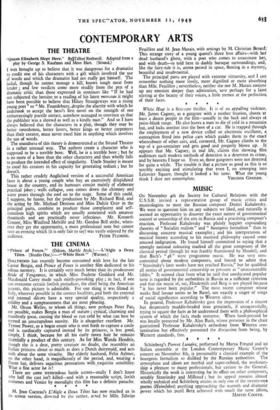MUSIC
ON November 4th the Society for Cultural Relations with the U.S.S.R. invited a representative group of music critics and musicologists to meet the Russian composer Dmitri Kabalevsky. We were to question him on any subjects we liked, and naturally it seemed an opportunity to discover the exact nature of governmental control or censorship of the arts in Russia and a practising composer's reaction. Professor Kabalevsky was plainly happier expounding theories of " Socialist realism " and " bourgeois formalism " than in discussing concrete musical examples ; and his interpretation of musical history according to his received philosophy caused some amused indignation. He found himself committed to saying that a strongly national colouring marked all the great composers of the classical period (though he was frankly flummoxed by Handel), and that Bach's " 48 " were programme music. He was very non- committal about modern composers, and forced to admit that " Stravinsky's later works have not reached Russia," but he qualified all stories of governmental censorship or pressure as " unaccountable fables." It seemed clear from what he said that uneducated popular taste is regarded by the authorities in Russia as a sufficient criterion and that the music of, say, Hindemith and Berg is not played because " it has never been popular." The most recent composer whose works find favour seems to be Ravel, not exactly a singer of songs of social significance according to Western ideas.
In general, Professor Kabalevsky gave the impression of a sincere but desperately muddle-headed man genuinely, if unsuccessfully, trying to square the facts as he understood them with a philosophical system of which the facts made nonsense. When hard-pressed he was loyally protected by Mr. Alan Bush, whose presence in the chair guaranteed Professor Kabalevsky's orthodoxy from Western con- tamination but effectively prevented the discussion from being, by Western standards, free.
* * * * Schonberg's Pierrot Lunaire, performed by Marya Freund and an Italian ensemble at the London Contemporary Music Centre's concert on November 8th, is presumably a classical example of the bourgeois formalism so disliked by the Russian authorities. The atmosphere and idiom are morbid and super-refined, the workman- ship a pleasure to many professionals, but caviare to the General. Historically the work is interesting for its effect on other composers, notably Stravinsky and Milhaud ; but its appeal remains almost wholly technical and Schonberg attains in only one of the twenty-one poems (Heimfahrt) anything approaching the warmth and dramatic power which his pupil Berg achieved with much the same idiom.
MARTIN COOPER.


































 Previous page
Previous page